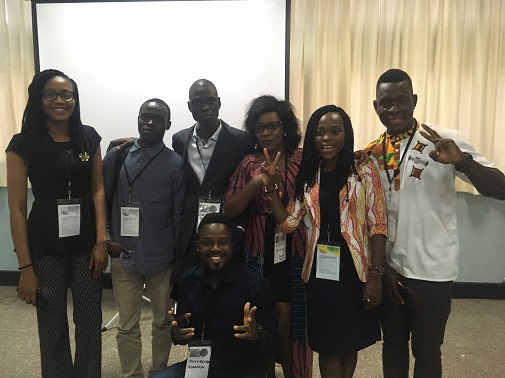Climate Chance Africa: Training to more effectively process climate information
Do you know what the IPCC, COP or NDCs are? Can you explain what a mitigation measure is and how a carbon market operates? Understanding climate-related information requires having in-depth knowledge and a command of certain technical terms. It is therefore essential to conduct popularisation activities in order to improve the understanding of these issues and raise the awareness of the general public and decision-makers. For ECOWAS and its Member States, communication and popularisation are among the key tools to help implement their climate commitments.
The media, a key partner
The media have a key role to play in this. “It’s good for society to have journalists capable of writing about these subjects which can make it better”, explains Chris Wright, Co-Director of the Climate Tracker network of journalists, who led the training. “Journalists trained in these issues could potentially have an impact on reducing pollution by sometimes pushing the authorities towards political awareness, through sensitising the general public”.
Furthermore, for the journalists, addressing climate change and energy is an excellent professional opportunity. “It fast-tracks a career as because there is little competition, it is possible to have great opportunities”, continues Chris Wright, “and it is an occasion to gain international visibility and dissemination. Indeed, European and American editors are increasingly on the lookout for local journalists capable of conducting investigations in these areas where they cannot do it themselves”.

However, to pass on information in an educational, precise and effective manner, journalists must themselves have the keys to understanding, analysing and popularising. The GCCA+ West Africa project, which is financed by the European Union and implemented by Expertise France, is a partner of the Climate Chance Africa summit and has supported the organisation of a training course for African journalists seeking to sharpen their knowledge on the subject.
Equipping journalists
The training was given in English and French and focused on journalistic methods and techniques to analyse information about the climate and on how to interpret climate news.
“We are first and foremost journalists: we haven’t necessarily been given training on the environment”, explains Francine Oboubé Kakpo, a Beninese blogger and environmental activist. “As my blog aims to educate, inform and raise awareness, it was essential for me to understand the themes and give myself the tools to be able to rewrite the information in an accessible language”, she adds.
“I read a lot about the environment, but I had never thought about certain angles to tell my stories, especially those of people, citizens who are affected by climate change”, says Jennifer Ugwa, a Nigerian journalist at the International Centre for Investigative Reporting (ICIR). “It’s especially important because here in Africa, climate change is often perceived as something unreal, so by adding a very humanistic aspect to it, people will be able to feel more concerned”, she concludes.
Towards solutions journalism
For Hector Sann’do Nammangue, a Togolese environmental journalist, “This training provides an understanding of the techniques of solutions journalism, which makes it possible to go further than simply condemning the impacts of climate change, by also highlighting solutions that are available”.

This opinion is shared by Francine Oboubé Kakpo: “I’m very much going to base myself on solutions journalism, as my blog, which targets French-speaking Africa, also aims to inspire other young people all over the world and to discover the actions that other young Africans are already implementing.”
Following the training, the thirty or so participant journalists were able to attend and cover the Climate Chance summit, which was held on 17 and 18 October. This major event for mobilisation on the climate in Africa gathered 2,000 non-State actors that are combating climate change in Africa: local governments, companies, trade unions, environmental NGOs, farmers, researchers, etc.
📰 The journalist's workshop on climate change with @ClimateTracking is coming to an end!
— Climate Chance (@ClimateChance) October 16, 2019
▶️ Very good participation of our journalist's from Ghana, Nigeria, Togo, Benin and Burkina Faso.
▶️ Hoping they will have a lot of stories to showcase during the rest of the Summit pic.twitter.com/kzUELQ6T3l
 Find out more about the Climate Chance summit: www.climate-chance.org
Find out more about the Climate Chance summit: www.climate-chance.org
 Find out more about the GCCA+ programme: www.gcca.eu
Find out more about the GCCA+ programme: www.gcca.eu

